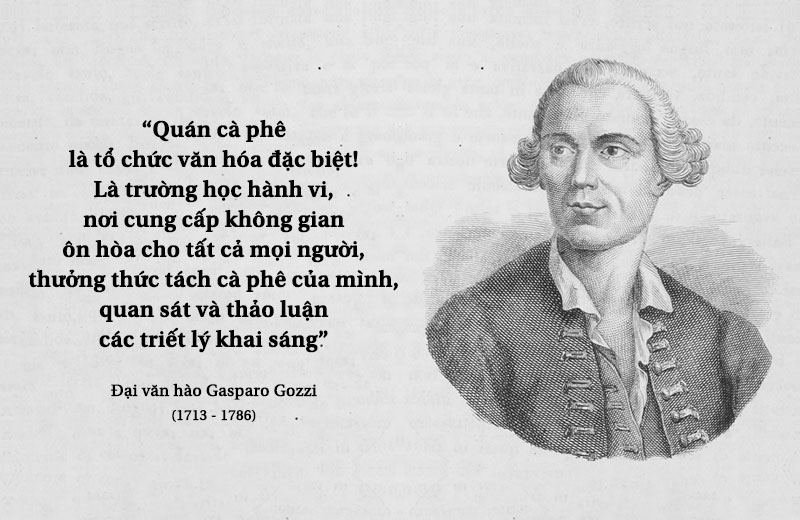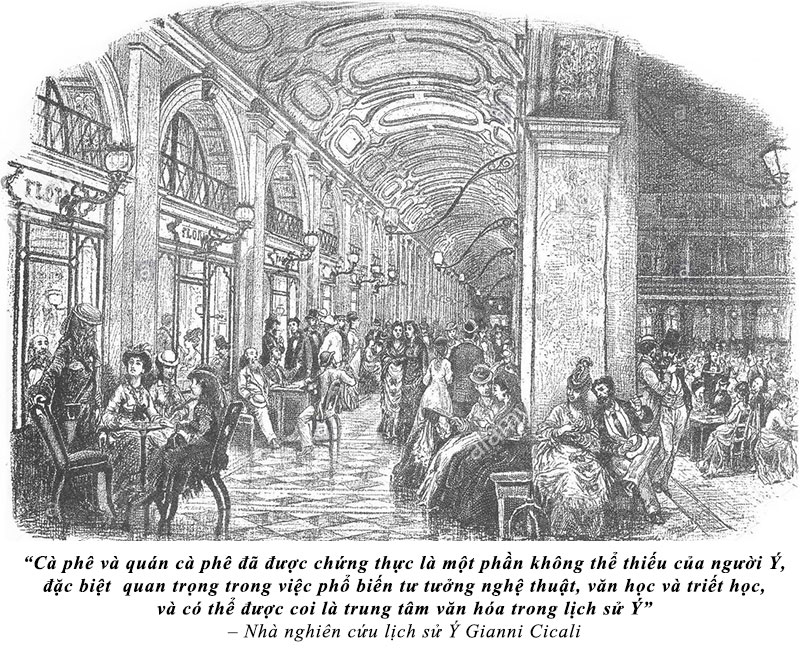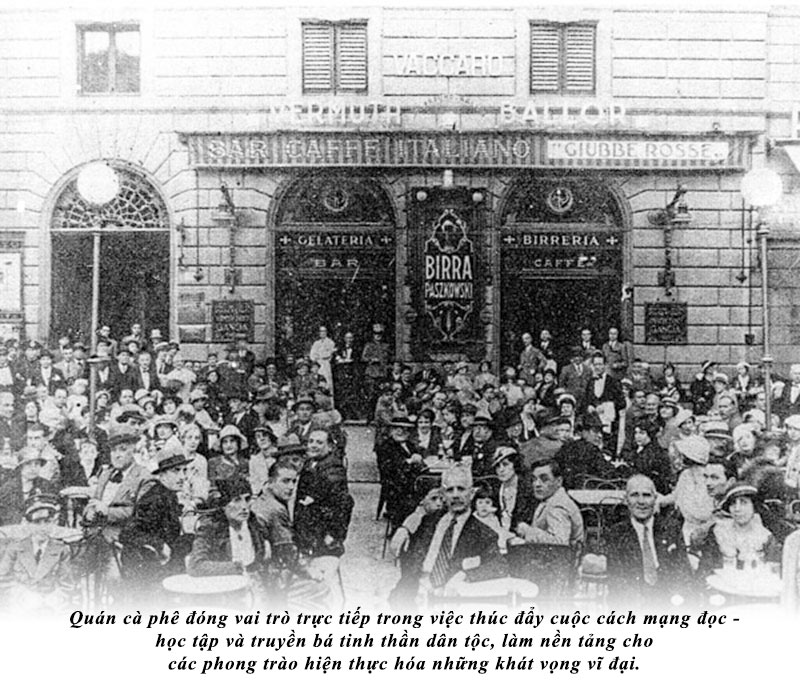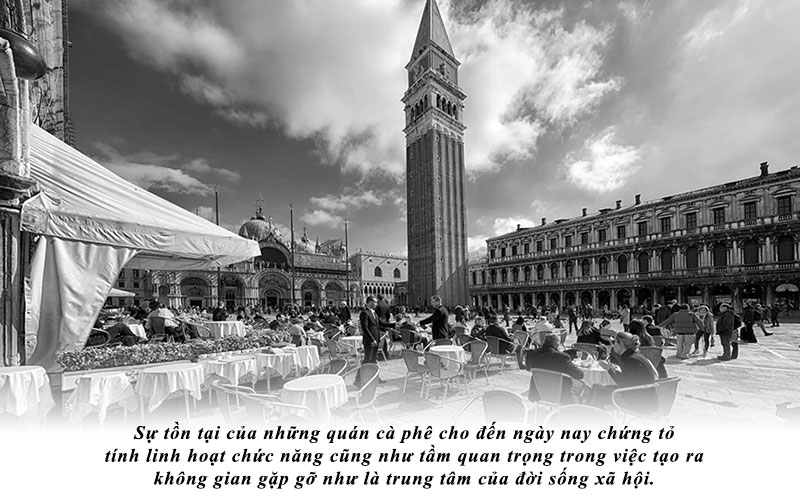Article 27: The great writer Gasparo Gozzi: “The coffee shop is a special cultural organization!”
Before political and economic unification, the Italians initiated cultural homogenization activities. The cafe was established as a special organization, laying the foundation for movements to establish Italian identity.

“The coffee shop is a special cultural organization! A school of behavior that provides a peaceful space for all to enjoy their cup of coffee, observe and discuss enlightening philosophies.” The great writer Gasparo Gozzi (1713 – 1786)
The space to nurture great wills, for great national aspirations
Italy used to be the center of typical civilizations of mankind, leading to the shaping of European culture. In particular, the Roman Empire was the most powerful superpower in the world, dominating the Mediterranean region, North Africa and Western Asia. However, when Rome collapsed, Italy underwent a period of separation into many large and small territories and city-states. Italy was weakened in all aspects, the conquered territory remained only a geographical manifestation. Ethnic conflicts caused the country to be further torn apart. Political disunity led to distinct divisions in the economy, customs and language of each region.
By the 14th century, elite, scholarly thinkers and individuals tried to mobilize the revival of ancient Roman culture. Over the previous two centuries, the Renaissance movement had created a revolution on the cultural and ideological fronts, arousing the concept of developing the national elite. However, the movement only represented the newly formed bourgeoisie, promoting the self-reliance of each individual, so Italy had not been fully unified. Until the Italian intelligentsia approached the Enlightenment, nationalism rose strongly. In the face of the still-divided Italian ideological situation, the intelligentsia demonstrated the radical ideological transformation, the desire to once again recreate the splendor of the nation.
Reformers initiated a period of cultural unification, transforming the mindset that underpinned the Italians “to become one and indivisible”. That is, before the unification of Italy, it is necessary to define the Italian identity, the Italian national character. This journey cannot be just an erudite individual or a group of intellectuals but must be the awakening and action of every person born on Italian territory. Essays on the magazine “Il Caffè” – the best magazine representing the ideas of the Italian enlightened intellectuals, offered innovative views, and sowed the conceptt of the Italian people – the people belonging to the same country, speaking the same language, sharing the same culture, the same tradition… and different from other peoples.
The idea of innovation motivated and encouraged Italians to really act together. It was during this period that the cafe space became an ideal place to arouse great intentions and act for great national aspirations.

“Coffee and the coffee shops have proven to be an integral part of Italians, especially important in the dissemination of artistic, literary and philosophical thought, and can be considered as cultural centers in Italian history” – Italian historian Gianni Cical
Different from other academic spaces which are for certain audiences. The coffee shop is the meeting point of philosophers, writers, artists, aristocrats, merchants, explorers… and even ordinary people in society. Such a diverse world brings many streams of thought from micro to macro, stimulating the imagination and creativity of innovators. Also from the discussion over a cup of coffee in a coffee shop, great minds meet and become brothers and sisters and partners, pursuing greatness together.
A place to realize great aspirations
Recognizing the creation of national dignity as a prerequisite for national unification, intellectuals in many fields made efforts to recreate the national identity and shape the Italian style. The coffee shop – the center of convergence and spread of knowledge and new ideas took on many roles at the same time: school, library, press distribution center, theater, political headquarters, clubs of literature and art…
At the cafe, anyone could come to debate, find information and work together to initiate new trends. In particular, the intellectuals pioneered to promote literary and artistic movements, laying the foundation for awareness before implementing the reconstruction of the country.
Coffee shops play a direct role in promoting the reading-learning revolution and spreading the ideal. Here, coffee drinkers could find books, newspapers and enlightening magazines such as “Il Caffè”, “Gazzetta Veneta”, “L’osservatore Veneto”, “Il Sognatore Iataliano”, “Giornale Veneto de” ‘Letterati’, ‘La Minerva’, ‘La Frusta Letteraria’… which were widely available, sometimes for free. Important Italian literary journals were also born from the conversations in the cafe. Caffè Giubbe Rosse was the birthplace of the magazines “Lacerba” and “Solaria”. Caffè Florian was the place where the magazine “Gazzetta Veneta” was founded and published, and also a regular place for patriotic poets Ugo Foscolo, Silvio Pellico, Giovanni Berchet…
Reading culture created a spillover effect of enlightened thought. At the same time, through literary, journalistic, and artistic works, patterns of language, culture, and lifestyle behaviors imbued with Italian identity were accepted throughout Italy. From here, the national spirit permeated the masses, becoming a concrete political aspiration for renewal, national unity, national unification, and together re-establish a mighty Italy.

Coffee shops played a direct role in promoting the reading-learning revolution and spreading the national spirit, as the foundation for movements to realize great aspirations.
The cafe space also developed a number of important Italian cultural, economic and political institutions. It was at the Antico Caffè Greco that the Association of Scholars and Experts in the History of Rome “Gruppo dei Romanisti” held its monthly meeting to offer an important solution to the Italian cultural problem. The Caffè dell’Ussero was the venue for the first “Congress of Italian Scientists” in 1839, to encourage the professionalization of Italian science.
The Gran Caffè Renzelli, Domenico Frugiuele and Gianfelice Petrassi promoted a revolt against the Bourbons in 1844 and decided to declare a constitutional government, which was also the event that first awakened patriotism among the Venetians. The Caffè Pedrocchi was one of the most important meeting places for patriots during the revolt of Italian Unity (Risorgimento). The conversation of doctor-writer Filippo Mazzei and US President Thomas Jefferson at Caffè dell’Ussero inspired the great thought “All men are created equal”, which was included in the Declaration of Independence in 1776…

The existence of the coffee shop to this day proves its functional versatility as well as the importance in creating the meeting space as the center of social life.
Progressive thought and innovative reforms initiated in coffee shops have laid an important foundation for creating groups, community organizations in terms of culture, language, economy… And from those communities formed in the cafe has gradually expanded to the larger masses. That spillover effect creates unimaginable power, attracting and uniting people in many fields, classes, religions, regardless of background or social role. It was the homogeneity of culture, ideology, and aspiration that created a solid premise for the Italian Unification movement, creating a territory-complete and culturally distinct Italy today.
THE REAL COFFEE
ROASTED ONLY FOR PEOPLE OF WISDOM!
Source: “The Philosophical Way of Coffee” – copyright by Trung Nguyen Legend


